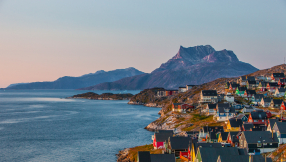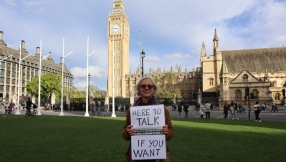World Council of Churches head Dr Samuel Kobia has called concerns about climate change "a matter of faith" and told the Christian faith community that it must be at the vanguard of the response.
In a visit this week to the New York headquarters of the global humanitarian agency Church World Service global humanitarian, Dr Kobia said, "We have seen that when we become careless the effect is what we are seeing now with global warming.
"I think as Christians we should be the ones to lead the way so that others then can follow because for us it is not just a matter of political or economic or ecological concern it is a matter of faith."
Dr Kobia was in the United States for meetings with heads of churches and other ecumenical leaders, including Church World Service Executive Director and CEO John McCullough. Church World Service is a member of the Central Committee, the chief governing body of the World Council of Churches.
Although the subject has only recently become a focus of global concern, Kobia emphasised that the WCC is not a newcomer to the debate, pointing to the Justice, Peace and the Integrity of Creation programme that has been up and running since 1992. Through the programme, the WCC has addressed the relationship between development and the integrity of creation.
Kobia said he would like to invite the entire Christian community to be involved in the work on climate change.
"It is a gospel imperative for churches to be involved in the work on climate change. It is a gospel imperative because human beings are entrusted with the rest of God's creation. It is there for us not to plunder and not to dominate, but to care," he said.
A statement presented by the WCC to government leaders at the recent UN climate change conference in Bali said that societies must move away from "promoting endless growth and production of goods" as well as a "seemingly insatiable" consumption.
It added that "the poorer carry the burden of the irresponsible waste of resources, energy and extreme consumerism of the richer" and called for action from world governments to resolve "the problems of the great majority of today's world population".
Most Popular
Stay up to date with Christian TodayNews

President Trump's Arctic love affair
Surely an ally should not be presented with a take it or leave it poke in the eye?

Bradford Cathedral to host launch of 2025 Cathedrals Cycle Relay in UK City of Culture Year
The third national Cathedrals Cycle Relay (CCR) is set to launch on 24 May 2025 from Bradford Cathedral, coinciding with Bradford’s year as the UK City of Culture.

Megachurch pastor criticises Disney's ‘Snow White’ remake for abandoning biblical themes
Harvest pastor Greg Laurie has criticised Disney’s live-action remake of ‘Snow White’ for stripping away what he sees as its original gospel-centred message.

US warns UK over free speech, citing pro-lifer's prosecution
The US state department has issued a statement saying it is "concerned about freedom of expression in the United Kingdom" and that it is "monitoring" the case of a pro-life woman prosecuted for holding a sign offering help within an abortion clinic "buffer zone".





